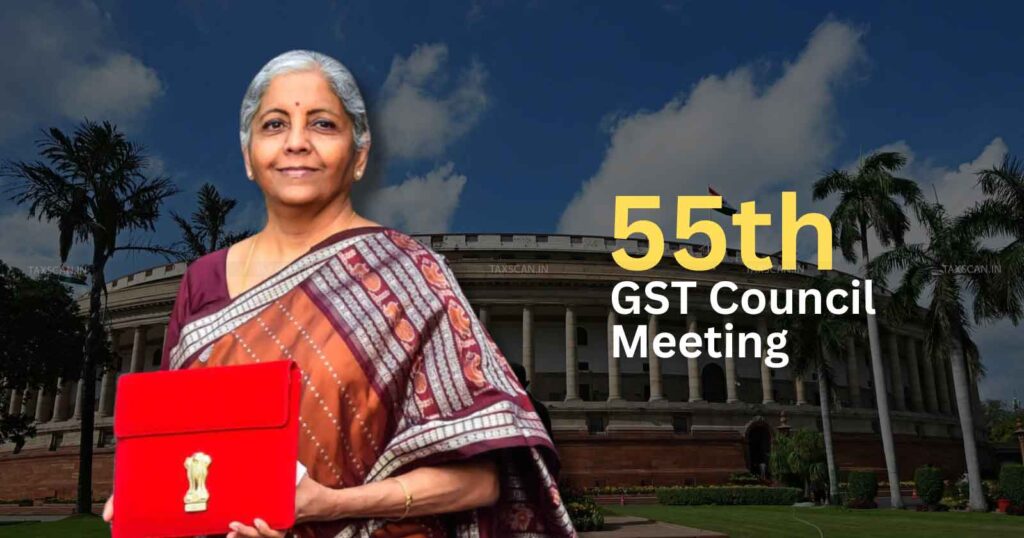55th GST Council Meeting 2024: Key Updates on Penal Charges, Tax Exemptions, and Compliance Changes

CA Tarun Garg | Updated on: Jan 30th, 2025 | 3 min read
Introduction
The 55th GST Council Meeting, held in Jaisalmer on December 21, 2024, introduced critical clarifications and regulatory relaxations to simplify tax compliance and provide relief across sectors. From exemptions for Payment Aggregators to regularizing past tax liabilities, these changes aim to streamline India’s GST framework. In this comprehensive guide, we break down the key takeaways, implications for businesses, and actionable steps to stay compliant.
1. Introduction to the 55th GST Council Meeting
The GST Council’s 55th meeting focused on resolving ambiguities, reducing litigation, and aligning tax rules with evolving economic needs. Key areas addressed include:
- Penal charges for loan defaults.
- Exemptions for Payment Aggregators and skill development programs.
- Regularization of past GST payments for R&D services.
- Clarifications on GST applicability for municipal services.
These updates reflect the Council’s commitment to fostering ease of doing business while ensuring revenue stability.
2. No GST on Penal Charges by Banks and NBFCs
What Changed?
The Reserve Bank of India (RBI) directed Regulated Entities (REs) like banks and NBFCs to replace penal interest with penal charges for loan defaults, effective January 1, 2024. The GST Council clarified that no GST applies to these penal charges, as they are not a “supply” under GST law.
Why It Matters
- Earlier Confusion: Tax authorities questioned whether penal charges qualified as “consideration for tolerating default.”
- Clarification: The Council cited Circular No. 178/10/2022-GST (August 2022), which ruled that penalties for contract breaches are not taxable.
- Impact: Banks/NBFCs no longer need to charge GST on penal charges, reducing compliance costs.
Action Step
Businesses must update their systems to exclude GST from penal charges levied post-January 1, 2024.
3. GST Exemption for Payment Aggregators (PAs)
What Changed?
The Council extended the GST exemption under Notification No. 12/2017-CTR to RBI-regulated Payment Aggregators (PAs) for small transactions (≤₹2,000) via cards.
Key Details
- Who Benefits? PAs like Razorpay and PayU (not Payment Gateways like Stripe).
- Why? PAs handle funds like “acquiring banks,” pooling payments in escrow accounts before settling with merchants.
- Exemption Scope: Limited to settlement functions (e.g., debit/credit card transactions).
Impact on Businesses
- Cost Savings: Reduced GST burden on small transactions.
- Clarity: PAs no longer need to litigate taxability of settlements.
Action Step
PAs must ensure their systems reflect this exemption for eligible transactions.
4. GST Regularization for R&D Services Funded by Grants
What Changed?
- Exemption Effective October 10, 2024: R&D services by government entities/research institutions funded via grants are now GST-free.
- Past Regularization: GST paid on such services from July 1, 2017, to October 9, 2024, is regularized on an “as is where is” basis (no refunds or demands).
Why It Matters
- Earlier Disputes: Entities like DRDO and CSIR faced GST demands on grant-funded projects.
- Relief: Reduces litigation and compliance uncertainty.
Action Step
Government entities should review past transactions but avoid filing refund claims for closed periods.
5. NSDC Skill Development Programs: Exemption Restored
What Changed?
- Exemption Withdrawn (Oct 2024): GST was briefly imposed on skilling services by NSDC partners.
- Exemption Restored (Jan 2025): After industry pushback, the Council reinstated GST exemption for NSDC-approved trainers.
Impact
- Skill Development Boost: Lowers costs for vocational training programs.
- Interim Period Regularized: GST paid from October 10, 2024, to January 15, 2025, is regularized.
Action Step
Training partners should revert to exemption claims post-January 15, 2025.
6. GST Applicability on MCD Facility Management Services
Clarification
- No Exemption: Services like housekeeping, civil maintenance, and horticulture for MCD offices attract GST.
- Reason: These services don’t relate to municipal functions under Article 243W of the Constitution.
Action Step
MCD must ensure GST is paid on facility management contracts.
7. DDA Not Classified as a “Local Authority”
Implications
- No RCM Relief: Services provided to/by DDA are taxable under forward charge (not reverse charge).
- Reason: DDA doesn’t control municipal funds, failing the Section 2(69) definition of “local authority.”
8. RCM on Commercial Rent: Relief for Composition Taxpayers
What Changed?
- RCM Withdrawn (Jan 2025): Composition taxpayers no longer need to pay GST under RCM for renting commercial property from unregistered owners.
- Interim Period Regularized: GST paid from October 10, 2024, to January 15, 2025, is accepted without penalties.
9. GST Regularization for Electricity Ancillary Services
Exemption Expansion
- Meter Testing/Repairs: Now GST-free for transmission/distribution utilities.
- Alignment Period Regularized: October 10, 2024, to January 15, 2025.
10. GST Regularization for Goethe Institute Services
Key Takeaway
- Cultural Training: GST payments for language/cultural courses (July 2017–March 2023) are regularized.
- No Penalties: Institutes acted under a bona fide belief of exemption.
Implications for Businesses
- Compliance Simplification: Reduced litigation with clarified exemptions.
- Cost Savings: Sectors like fintech, education, and R&D benefit from lower tax burdens.
- Retroactive Relief: Regularization prevents penalties for past periods.
FAQs: 55th GST Council Meeting 2024
Q1. Are penal charges by banks GST-free?
Yes, if levied under RBI’s August 2023 guidelines.
Q2. Does GST apply to NSDC training programs?
Exemption restored from January 16, 2025; GST paid earlier is regularized.
Q3. Is DDA a local authority under GST?
No, services to/from DDA are taxable under forward charge.
Conclusion
The 55th GST Council Meeting strikes a balance between taxpayer relief and compliance clarity. Businesses must update their processes to align with exemptions for penal charges, Payment Aggregators, and skill development programs. For unresolved queries, consult a GST expert to avoid penalties.
For more details refer the official circular issued here
Stay Updated, Stay Compliant!
About Author

Name: CA Tarun Garg
Qualification: CA, CS, B.Com
Company: T Garg & Co.
Mobile: +91-9999147621
Email: Tarun.garg@mail.ca.in
Location: New Delhi
Let’s Connect!
Popular Articles
Trusted By Your Favorite Brands






